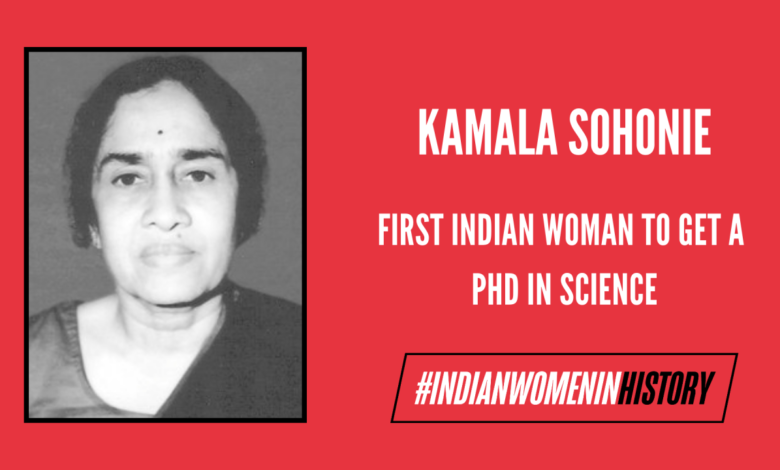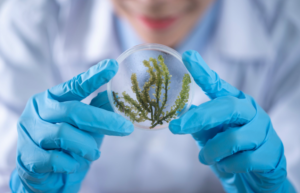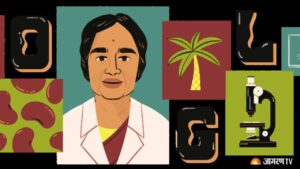Kamala Sohonie: The First Indian Woman To Get PhD in Science

Kamala Sohonie was an Indian biochemist and the first Indian woman to earn a PhD in science. Her groundbreaking research, notably on Neera, earned her the Rashtrapati Award.
Kamala Sohonie (1912–1998) was an Indian biochemist who made significant contributions to the field of enzymology. Born on August 14, 1912, in Bombay (now Mumbai), India, she was the daughter of scientist Sir C. V. Raman, a Nobel laureate in physics.
Kamala Sohonie pursued her education at the University of Cambridge, earning her Bachelor’s and Doctoral degrees in biochemistry during the 1930s. Her research focused on understanding enzyme reactions and their mechanisms. Notably, she conducted pioneering work on the enzyme urease.
In 1939, Kamala Sohonie became the first Indian woman to receive a Ph.D. in the field of science from the University of Cambridge. Later, she returned to India and joined the Biochemistry Department at the Indian Institute of Science in Bangalore.
Throughout her career, Sohonie’s research contributed to the understanding of enzyme kinetics, particularly in the context of urease. Her work laid the foundation for subsequent research in enzymology. Despite facing challenges and gender biases prevalent in her time, Kamala Sohonie’s dedication to science and her groundbreaking contributions have left an enduring legacy in biochemistry.
Her work on the proteins in legumes provided significant insights into their nutritional value. Sohonie’s pioneering research has had a lasting impact on the development of nutritional science and has paved the way for future generations of female scientists in India and beyond. Her legacy is celebrated worldwide, reflecting her exceptional contributions to science.
Pioneering Journeys In Science
Kamala Sohonie’s remarkable journey in science is a beacon of inspiration for aspiring young women globally. Born in Indore, India, she challenged gender biases to become a trailblazer in biochemistry. Her tenacity and dedication paved her path and opened doors for generations to come. Now, let’s dive deep into her extraordinary pursuits that shaped scientific history in India.
Breaking Barriers At Iisc
Dr Sohonie’s struggle began at the Indian Institute of Science (IISc) in Bangalore, where she sought admission to higher studies. Despite impeccable academic records, she faced rejection solely based on her gender. Undeterred, Dr Sohonie protested until the director, Nobel Laureate C.V. Raman, granted her provisional admission, setting a precedent for the institute—her eventual success made her the first woman to graduate from IISc.
- Fearless pursuit: Overcame initial rejections at IISc.
- Provisional admission: Signified a big win for women in science.
- First female graduate: Laid the groundwork for future women scientists.
Trailblazing To A Ph.D.
Sohonie’s journey did not stop after her milestone at IISc. She went on to the University of Cambridge, marking another significant chapter in her life. She became the first Indian woman to earn a PhD in a scientific discipline from a British university. Her pioneering protein research in pulses earned her a PhD and greatly impacted nutritional science.
- Earned academic excellence: Achieved PhD from a prestigious university.
- Research on proteins: Advanced understanding in nutritional science.
- It has inspired countless women, Pioneering role models in the scientific community.

Kamala Sohonie’s Formative Years
Kamala Sohonie was a trailblazer who overcame societal barriers to etch her name in history. Born into a time when women in science were a rarity, she broke the glass ceiling with unyielding determination. Her path to becoming the first Indian woman to receive a PhD in a scientific discipline was paved with challenges. Let’s delve into the key moments from her early life that shaped her exceptional journey.
Early Education And Influences
Kamala’s passion for science was sparked early, influenced by her environment, and filled with academic chatter. It flourished in her school days, where she excelled in her studies. She earned her way into the prestigious University of Mumbai, a testament to her intellect and hard work.
Undeterred By Gender Bias
Facing a society reluctant to accept women in scientific roles, Kamala remained undaunted. She applied to the Indian Institute of Science (IISc) in Bangalore. Initially rejected on account of her gender, Kamala didn’t falter. Her persistent efforts led to a revolutionary change, making her the first woman admitted to the IISc. This marked the beginning of her legacy.
This pioneering spirit, rooted within Kamala’s upbringing and education, laid a solid foundation for her to challenge and transform gender norms. A narrative of resilience and perseverance inspires aspirants, especially young women in science, even today.
Key Scientific Contributions

Kamala Sohonie was a trailblazing Indian biochemist whose work reshaped our understanding of nutrition. Her discoveries continue to influence the fields of biochemistry and nutrition science. In particular, Kamala Sohonie’s pioneering research on proteins and enzymes has paved the way for many nutritional therapies.
Proteins In Pulses: A Breakthrough
Dr Sohonie was the first to map the kind of proteins found in Indian pulses, which are a staple in the Indian diet. Her groundbreaking work demonstrated that pulses are packed with high-quality proteins — essential for human health. Dr Sohonie’s research was both innovative and socially impactful, offering a solution to nutritional deficiencies prevalent in India during her time.
- Identified essential amino acids absent in cereals
- Suggested a combination of cereals and pulses for a balanced diet
- Contributed to combating protein malnutrition in India
Cytochrome C Discovery
In her illustrious career, Kamala Sohonie contributed significantly to our understanding of cytochrome c, an essential component of the cellular respiratory chain. This was crucial as it laid the foundation for understanding cellular respiration — a process critical for life.
|
Impact |
Scope of Discovery |
|
Advanced knowledge of cellular respiration |
Found cytochrome c in plant tissues |
|
Enabled further research into energy production in cells |
Helped in defining the electron transport chain |
Impact On Nutrition And Health
Kamala Sohonie, a biochemistry trailblazer, significantly improved our understanding of nutrition and health. Her work helped countless children lead healthier lives. The discoveries made by Sohonie in nutrition and health are monumental. Her dedication to science has had a lasting impact.
Neera Research
Kamala Sohonie’s groundbreaking Neera study marks a milestone. Neera, a sap extracted from palm trees, was the focus of her research. She discovered its nutritional potential to combat child malnutrition. Her findings revealed that Neera could serve as a supplement. It is rich in vitamins and minerals essential for healthy growth.
- High in vitamins, Especially Vitamin B complex.
- Minerals: Contains potassium and iron.
- Protein content: Beneficial for muscle development.
Child Malnutrition
Sohonie’s work offered a solution to widespread child malnutrition. She pointed out how nutritional deficiencies could be rectified. Neera played a pivotal role as a nutritional supplement for children. This was especially true for tribal communities, who needed it most.
|
Nutrient |
Benefit |
|
Vitamins |
Improves immune function |
|
Minerals |
Supports bodily functions |
|
Protein |
Enhances growth and repair |
A Legacy Of Public Health Improvements
Through her research, Sohonie left a legacy that transcends time. Her work created more than just immediate changes. It paved the way for ongoing public health improvements. As the first Indian woman with a PhD in science, she inspired generations. She proved that science and perseverance can change the world for the better. Her Neera research shows how scientific discoveries can directly impact health and well-being.
Honours And Awards
Kamala Sohonie’s unprecedented achievements in biochemistry have not gone unnoticed. Recognized both in life and posthumously, her groundbreaking work earned her significant honours. Let’s celebrate the accolades that marked her legacy.
Rashtrapati Award And Recognition
Kamala Sohonie’s pioneering work in nutritional biochemistry was honoured with the prestigious Rashtrapati Award. This notable achievement recognizes her contribution to science and the impact of her research on society. Sohonie’s work on Neera extract showcased her dedication to combating malnutrition among children in India, earning her this high accolade from the President of India.
Dead and Legacy
Kamala Sohonie passed away on June 28, 1998, leaving behind a legacy marked by her pioneering contributions to biochemistry, particularly in enzymology. Her work on understanding enzyme reactions, focusing on urease, has impacted the scientific community.
Sohonie’s legacy extends beyond her research achievements. As the first Indian woman to earn a PhD in science from the University of Cambridge, she paved the way for future generations of women in science in India. Her perseverance and dedication in the face of gender biases and societal expectations have inspired many aspiring scientists.
The impact of Kamala Sohonie’s research is evident in the continued exploration of enzyme kinetics and biochemical pathways. Her contributions to understanding urease and enzyme reactions have influenced subsequent generations of biochemists, contributing to advancements in the broader field of molecular biology.
Beyond her scientific achievements, Sohonie’s life is a testament to breaking barriers and pursuing one’s passion despite societal challenges. Her legacy endures in the annals of scientific literature and the narratives of women in science, where her journey remains a source of inspiration.
In recognition of her contributions, awards and honours have been established in Kamala Sohonie’s name, ensuring that her name is forever associated with the pursuit of knowledge and scientific excellence. Her life story underscores the significance of diversity and inclusivity in scientific endeavours and stands as a beacon for those who aspire to make meaningful scientific contributions.
Conclusion
Kamala Sohonie’s legacy stands as a testament to perseverance and intellect. Her groundbreaking work unlocked new possibilities in biochemistry. Her story inspires future scientists, especially women, in India and beyond. Sohonie’s achievements remind us to push through barriers and contribute to the world’s scientific community.
Frequently Asked Questions [FAQ]
Question 1: What Is Kamala Sohonie Known For?
Answer: Kamala Sohonie is recognized for being the first Indian woman to earn a PhD in a scientific field. She significantly contributed to biochemical research.
Question 2: Did Kamala Sohonie Discover Cytochrome C?
Answer: No, Kamala Sohonie did not discover Cytochrome C. She made significant contributions to the study of proteins in plant tissues.
Question 3: Who Was The First Woman Inducted Into The Iisc?
Answer: Kamala Sohonie was the first woman inducted into the Indian Institute of Science (IISc).
Question 4: Who Was Kamala Sohonie?
Answer: Kamala Sohonie was a pioneering Indian biochemist, notable for being the first Indian woman to earn a PhD in a scientific discipline.
Question 5: What Did Kamala Sohonie Research?
Answer: She researched the proteins in pulses and contributed significantly to understanding nutritional science, including work on Neera.
Question 6: Why Is Kamala Sohonie Important?
Answer: Kamala Sohonie broke gender barriers in science, excelling in biochemistry and setting a precedent for future generations of female scientists in India.
Question 7: When Was Kamala Sohonie Born?
Answer: Kamala Sohonie was born in 1912 in Indore, India.
Question 8: Which University Awarded Sohonie Her Ph.D.?
Answer: Kamala Sohonie received her PhD from the University of Cambridge, making history as the first Indian woman to do so.
Question 9: What Did Kamala Sohonie’s Neera Research Find?
Answer: Her research on Neera demonstrated its potential to fight malnutrition among children in tribal communities in India.
Question 10: Did Kamala Sohonie Win Any Awards?
Answer: Yes, Kamala Sohonie was awarded the prestigious Rashtrapati Award for her outstanding work in biochemistry.


